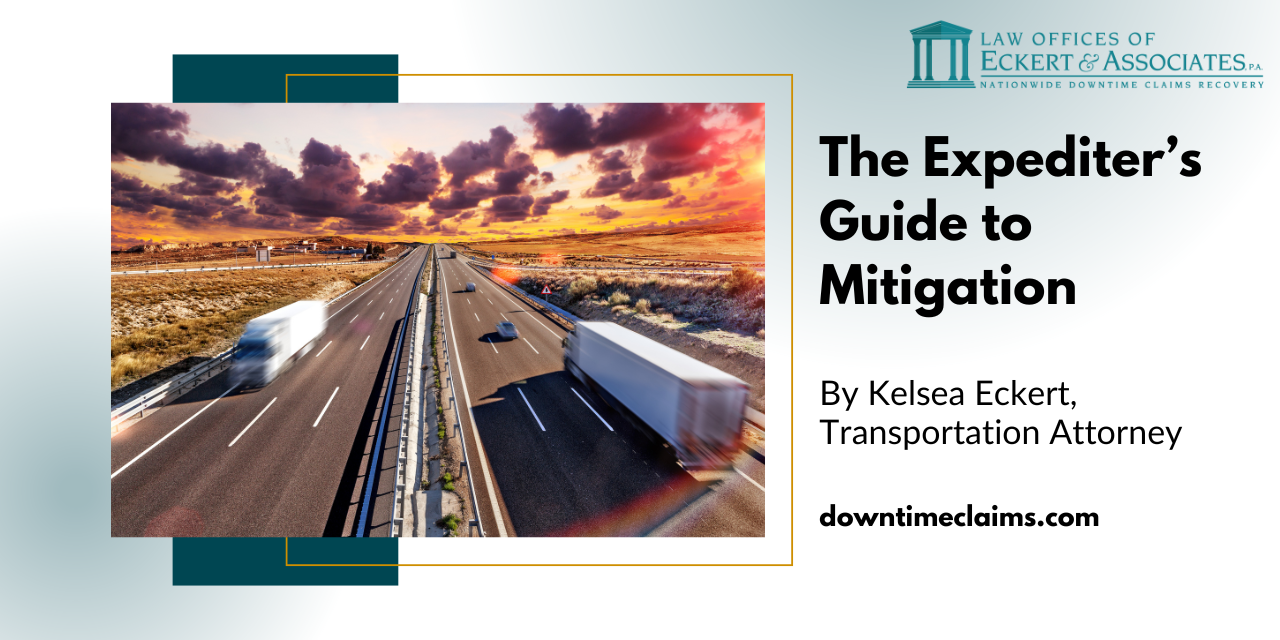Rescue Your Revenue

The Expediter's Guide to Downtime Mitigation
When a commercial trucker gets into an accident, it can be a major disruption. Dealing with insurance claims while trying to get a truck back on the road can be overwhelming. Many truckers, however, are unaware of the duty to mitigate their losses. Mitigation is an important concept that applies to single truck owner-operators, expediters, fleets, and other types of commercial vehicles. Even if you’re not the at-fault driver, you must make reasonable efforts to reduce your damages. Failing to do so could turn a downtime claim into a nightmare.
What is Mitigation?
Mitigation means taking reasonable steps to lessen your losses. Common examples include trying to rent a replacement truck, getting your own insurance involved, or paying for repairs yourself to get back on the road. If no attempts to mitigate are documented, it could negatively impact your case. So, it’s crucial to document every step in writing.
The Expedited Trucker's Dilemma:
You own a truck that specializes in expedited deliveries. Now imagine it was sideswiped on the highway. As the owner, it’s your responsibility to do everything within reason to get the truck back on the road and expedite the claims process. In an ideal scenario, you would simply report the accident to the other party’s insurance company. However, adjusters are not always responsive or may deny liability for the damage caused by their insured.
It’s important to get the truck to a repair shop quickly and search for a comparable replacement vehicle while yours is being repaired. If you can’t find a suitable replacement, be sure to obtain denial letters from rental companies. In a perfect world, you would be reimbursed immediately for your lost income and/or rental expenses by the at-fault driver’s insurance. Unfortunately, this is not always the case, so it’s vital to collect written proof of mitigation at each step. This evidence is key for your attorney to effectively argue your case.
The Consequences of Not Mitigating:
A worst-case scenario would be if you only filed a claim with the other party’s insurance, which then denied the claim, ignored you, and took months to resolve the case, even after clear proof was provided. Meanwhile, you made no effort to mitigate your damages—you didn’t contact rental companies, nor did you document any rental denials or lack of available equipment.
If you fail to gather evidence that you tried to mitigate your damages, the other side might only offer a fraction of what you’re entitled to. This could mean the difference between a $1,500 offer and a $15,000 offer, for example.
Don’t Wait. Mitigate!
Don’t be at the mercy of the other driver’s insurance company. Don’t wait to get back on the road! Protect your business by doing what’s necessary to move your claim along, even if the other side isn’t cooperating. Document your attempts to rent and demand full compensation for your losses from the adverse adjuster. Remember, in most states, you don’t necessarily need to be successful in mitigating; you just need to show you made reasonable attempts.
If you have a claim and want to avoid it turning into a nightmare, give us a call at (904) 278-7688. We’re available to discuss all types of accident claims.
The information in this article is general in nature, and is not intended as legal advice.
